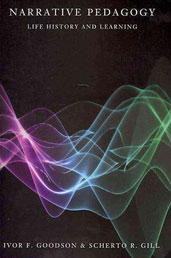Narrative Pedagogy
Learning and Narrative Pedagogy
However, it can be problematic to see the person and his/her life as a text or a story because there is the danger of losing sight of human subjectivity and agency. Our capacity as humans to re-construct our personal narrative allows us to gain a more critical and interpretive perspective of our life and thereafter our actions and ways of being in the world. In this book, we suggest this is achieved through creating an all-encompassing space for hermeneutic interpretation and dialogic interaction, which is empowering and inspiring.
Narrative learning is also ‘life learning’, learning in/through the process of living, and it involves ongoing elaboration and modification of a person’s life stories. Some people’s narrative capacity and character allows them to be more reflexive and more open to shifting their stories for their own personal wellbeing and for a better vision of their life. Others may take a more fixed view of their life’s course, in which case, their life story can become tyrannous and the result is stasis or ossification rather than life learning.
Hence we have pointed out that it is important to detail this process of narration and interpretation in order to understand how dialogue about life events can change a person’s understanding of the landscape within which their story is located. Life stories can change and adapt as life is lived, experienced and recounted. They can be modified by life events themselves, including new ideas encountered, new meanings engendered, new books read, new initiatives undertaken, new historical periods, new geographical locations, in short, by new circumstances. Modification as such can happen both with and without the stimulus of a deliberate and facilitating narrative process. Naturally, people can learn intuitively, especially those who are by nature more reflexive and have a strong narrative capacity. These are the people who take any opportunity that life offers to reflect on experiences, shifts and meaning. A tendency to be reflexive does not guarantee that learning takes places. From what has been discussed so far, it is necessary to create a space for dialogic narrative encounter between people because that in itself is the beginning of narrative modification. We have illustrated this in both Christopher and George’s cases. Hence, modification begins with new stimuli of this sort – these provide the opportunity to engender an additional life episode or new version of a life story.
